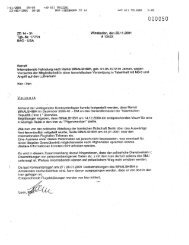Create successful ePaper yourself
Turn your PDF publications into a flip-book with our unique Google optimized e-Paper software.
In order to revise its pleading to conform to the new provisions of the FSIA,Plaintiffs filed a motion for leave to file a Third Amended Complaint, which was grantedby the Court. (Havlish docket no. 262.) The Third Amended Complaint (Havlish docketno. 363) asserts a single claim against <strong>Iran</strong> under §1605A and alleges <strong>Iran</strong>‘s materialsupport for al Qaeda. (See Appendix D.) On August 29, 2008, Plaintiffs filed the instantMotion for Judgment by Default Against Sovereign Defendants, seeking entry ofjudgment by default against <strong>Iran</strong> and the Defendant officials, agencies, andinstrumentalities of <strong>Iran</strong>.III.STANDARD OF PROOF UNDER THE FSIAThe FSIA provides that a court cannot enter a default judgment against a foreignstate ―unless the claimant establishes his claim or right to relief by evidence satisfactoryto the court.‖ 28 U.S.C. §1608(e); see Roeder v. Islamic Republic of <strong>Iran</strong>, 333 F.3d 228,232 (D.C. Cir. 2003)(―The court still has an obligation to satisfy itself that plaintiffs haveestablished a right to relief.‖). The ―satisfactory to the court‖ standard is identical to thestandard for entry of default judgments against the United States set forth in Rule 55(e),Fed.R.Civ.P., which uses the same language: ―No judgment by default shall be enteredagainst the United States or an officer or agency thereof unless the claimant establishes aclaim or right to relief by evidence satisfactory to the court.‖ Gates, 580 F.Supp.2d at 63.To prevail in a FSIA default proceeding, a plaintiff must present a legallysufficient prima facie case, i.e., ―a legally sufficient evidentiary basis for a reasonablejury to find for plaintiff.‖ Ungar v. Islamic Republic of <strong>Iran</strong>, 211 F.Supp.2d 91, 98(D.D.C. 2002). Although a court receives evidence only from the plaintiff when aforeign sovereign defendant has defaulted, 28 U.S.C. §1608(e) does not require a court to10









